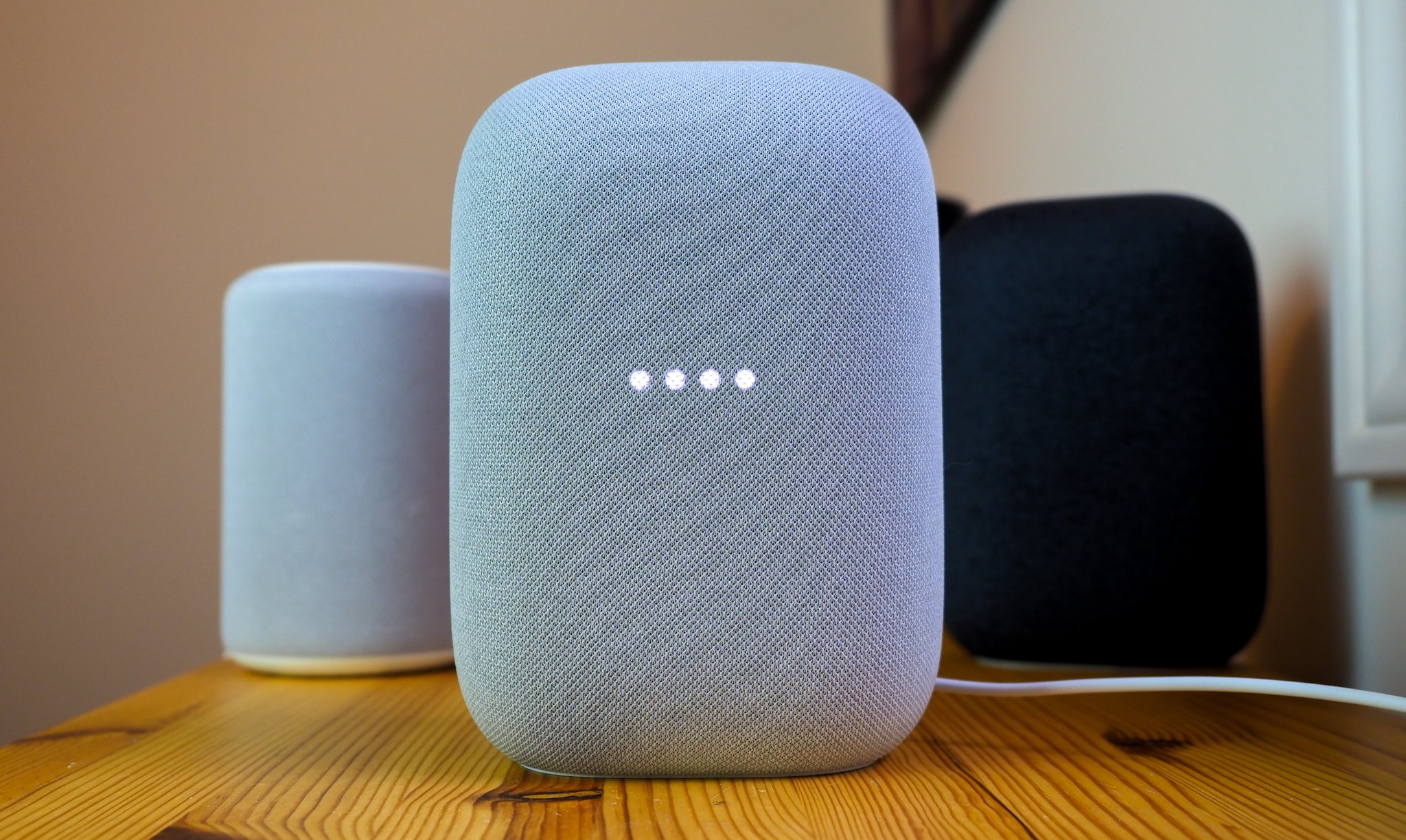This Week in Apps - App Store advertising expands, Google Play plans for safety, Epic v. Apple trial begins - Android
Welcome back to This Week in Apps, the weekly TechCrunch series that recaps the latest in mobile OS news, mobile applications and the overall app economy.
The app industry continues to grow, with a record 218 billion downloads and $143 billion in global consumer spend in 2020. Consumers last year also spent 3.5 trillion minutes using apps on Android devices alone. And in the U.S., app usage surged ahead of the time spent watching live TV. Currently, the average American watches 3.7 hours of live TV per day, but now spends four hours per day on their mobile devices.
Apps aren’t just a way to pass idle hours — they’re also a big business. In 2019, mobile-first companies had a combined $544 billion valuation, 6.5x higher than those without a mobile focus. In 2020, investors poured $73 billion in capital into mobile companies — a figure that’s up 27% year-over-year.
This week, we’re looking at the Apple-Epic trial, Apple’s App Store advertising expansion, App Tracking Transparency opt-in rates, TikTok’s new SDKs for third-party apps, Google’s plans for its own take on privacy labels, and more.
This Week in Apps will soon be a newsletter! Sign up here: techcrunch.com/newsletters
Top Stories
Apple-Epic Trial kicks off
This was the first week of the Epic Games antitrust lawsuit against Apple over App Store fees, and already it’s yielding some interesting content — mainly thanks to the internal Apple emails that have become part of the trial’s exhibits. So far, we’ve learned how Apple thought about App Store fees in the past, have gotten a peek inside internal conversations, learned of special deals it cut for Hulu and how it thought about punishing Netflix for ditching IAP, among other things.
Here are some of the highlights you may have missed.
Fees
- Apple’s App Store head Phil Schiller, previously Apple’s marketing chief, a decade ago questioned if the 70/30 split would last. In an email to Eddy Cue, he suggested that once the App Store reached $1 billion in profitability, Apple should cut its fees to 20-25%.
- Despite having said he’s fighting for all developers, Epic CEO Tim Sweeney in court admitted he would have accepted a special deal for a lower commission if Apple had offered one.
- Apple is disputing testimony from financial researcher Ned Barnes, which said the App Store had operating margins of almost 78% in 2019. Barnes said he had access to P&L estimates for fiscal year 2020, and statements from 2013-15, which aided in his calculations. Apple rebutted that it doesn’t allocate costs for the App Store so any documents discussing it wouldn’t have included expenses.
Competition
- Apple’s App Store VP Matt Fischer was questioned over a 2016 email where an employee said Fischer felt strongly about not featuring competitor apps on the App Store. Fischer said the employee who wrote the email was “very misinformed” and Apple has promoted competitors long before he joined the team in 2010.
App Store rejections
- Apple said it rejected 33-36% of apps submitted to the App Store from 2017-2019. Despite the number of rejections, less than 1% of developers appeal Apple’s decision. Most of the decisions about rejections are still upheld.
- 2017: 5.177 million submissions, 1.69 million rejections (33%)
- 2018: 4.79 million submissions, 1.7 million rejections (35%)
- 2019: 4.8 million submissions, 1.74 million rejections (36%)
Juicy emails
- Apple offered Hulu and others special deals that gave them App Store API access. In a 2018 email, an Apple exec confirmed Hulu was one of the whitelisted developers that had been given access to the subscription cancel/refund API which they had been using since 2015 to support instant upgrades using a two-family setup before subscription upgrade/downgrade capabilities were built.
- Emails revealed Apple tried to convince Netflix not to drop support for IAPs and questioned whether it should take punitive measures when Netflix’s tests were underway.
- Apple emails revealed internal conflict over the launch of App Store ads before launch, saying that ads would be at odds with Apple’s statements that it makes products without monetizing users.
Other tidbits
- Fischer said he was “blindsided” by the payment update that kicked off Epic’s battle with the App Store, noting the developer and Apple had a good relationship previously. He recalled dropping everything to promote Fortnite’s Travis Scott concert on the App Store, which he described as a “really cool concept.”
- Fortnite made more than $9 billion in 2018 and 2019. It made $5.1 billion in 2020.
- Fortnite may be returning to iOS through Nvidia’s cloud streaming service GeForce NOW.
- It was revealed that Epic paid Sony additional royalties beyond the 70/30 split to compensate for cross-play. Apple’s argument is that it’s being singled out over the 30% cut, when Epic was actually paying more to Sony but didn’t go after the console maker with the same complaint.
- Apple and Epic had once planned a subscription bundle that would have offered Fortnite Crew, Apple Music and Apple TV+ in a $20/mo package. The cut of subscription revenue each would take would have been based on whether the user signed up through Apple or through Fortnite.
Google to add a “Safety” section on Google Play in 2022
Months after Apple’s App Store introduced privacy labels for apps, Google says its own mobile app marketplace, Google Play, will follow suit…sorta. The company this week pre-announced its plans to introduce a new “safety” section in Google Play, rolling out in Q2 2022, which will require app developers to share what sort of data their apps collect, how it’s stored and how it’s used.
This includes what sort of personal information their apps collect, like users’ names or emails, and whether it collects information from the phone, like the user’s precise location, their media files or contacts. Apps will also need to explain how the app uses that information — for example, for enhancing the app’s functionality or for personalization purposes — and include their privacy policy, otherwise face “policy enforcement.”
But where Apple’s labels focus on what data is being collected for tracking purposes and what’s linked to the end user, Google’s additions seem to be more about whether or not you can trust the data being collected is being handled responsibly, by allowing the developer to showcase if they follow best practices around data security. It also gives the developer a way to make a case for why it’s collecting data right on the listing page itself. And Google says developers can showcase if their labels have been independently verified.
TikTok Login and more integrations are coming to third-party apps
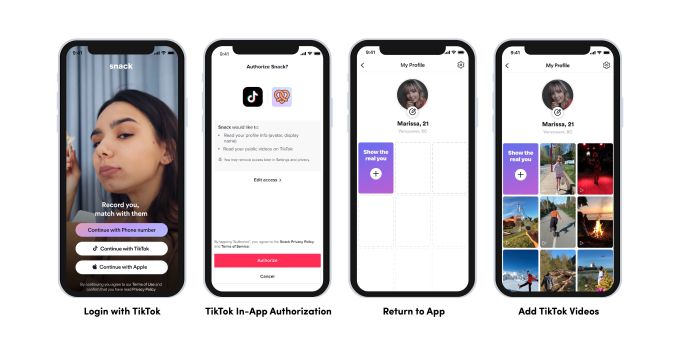
Image Credits: TikTok
TikTok is expanding its integrations with third-party apps. The company announced the launch of two new SDKs, the TikTok Login Kit and Sound Kit, that will allow apps on mobile, web and consoles to authenticate users via their TikTok credentials, build experiences that leverage users’ TikTok videos and share music and sounds back to TikTok from their own apps. The Login Kit allows an app’s users to sign in quickly using their TikTok log-in credentials, similar to other social log-ins offered by Facebook or Snap. Once signed in, users can then access their TikTok videos in the third-party app, potentially fueling entire new app ecosystems with TikTok content. Meanwhile, the Sounds Kit will let app users share their sounds or music back to TikTok as sounds.
Early adopters of Login Kit include gaming clips apps Allstar and Medal; anti-anxiety app Breathwrk; social app IRL; food reviews app Burpple; dating and friend-making apps Snack, Lolly, MeetMe, Monet, Swipehouse and EME Hive; creator tool provider Streamlabs; video game PUBG; and forthcoming NFT platform Neon. Sound Kits adopters include mobile multi-track recording studio Audiobridge; music creation and collaboration suite LANDR; hip hop music creation app Rapchat; and upcoming audio recording and remix app Yourdio.
Apple expands App Store advertising
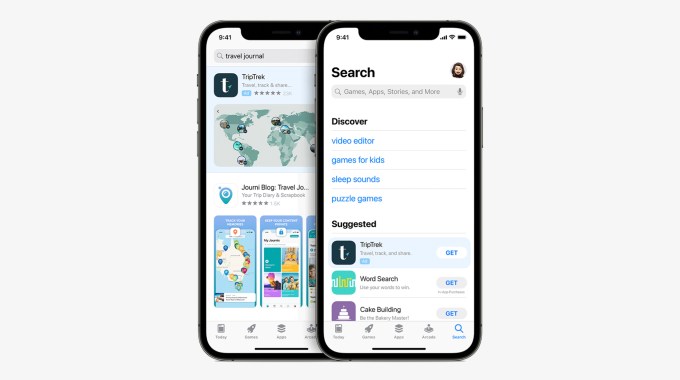
Image Credits: Apple
As Apple cracks down on the ad tech industry’s ability to personalize ads using user data, it is expanding its own advertising business with a new App Store ad slot. The new and more prominent ad placement is found on the App Store’s Search tab, which sees millions of visits from Apple device owners every month. The ad will appear in the Suggested section at the top of the list of apps.
Like Apple’s existing Search results campaigns, there’s no minimum spend required for a Search tab campaign, as these ads are called. Developers can spend as little or as much as they want, then start, stop or adjust the campaign at any time, says Apple. Ad pricing is based on a cost-per-thousand-impressions (CPM) model. The actual cost is the result of a second price auction, which calculates what the developer will pay based on what the next closest bidder is willing to pay. Impressions are counted when at least 50% of the ad is visible for one second.
Weekly News
Platforms: Apple
 Although a poll indicated iOS 14.5 users may be more willing to allow apps to track them than previously thought, Flurry’s app data shows that few are opting in. After upgrading to the new version of iOS, only 4% of U.S. iPhone users have enabled app tracking. Worldwide, the number jumps to 12%.
Although a poll indicated iOS 14.5 users may be more willing to allow apps to track them than previously thought, Flurry’s app data shows that few are opting in. After upgrading to the new version of iOS, only 4% of U.S. iPhone users have enabled app tracking. Worldwide, the number jumps to 12%.
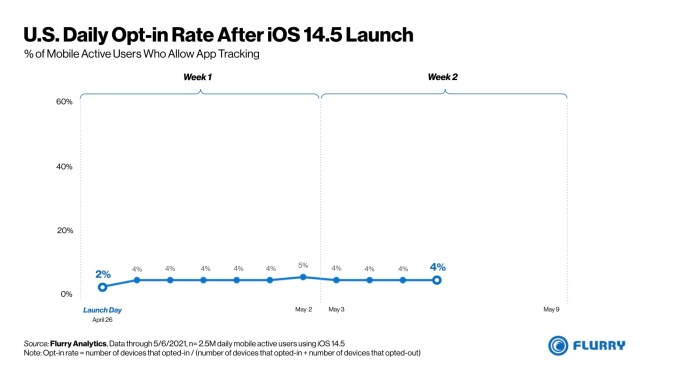
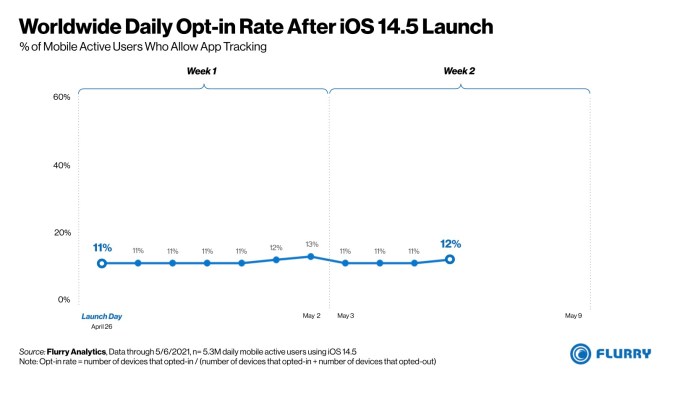
Image Credits: Flurry
Apple apologizes and refunds a woman $1,116.32, after her 9-year-old son (who has autism spectrum disorder) racked up charges on mobile games like Roblox and Coin Master. The son said he didn’t understand the games cost money. The son had memorized the mom’s Apple ID password, which he entered when asked to authorize the purchase. Apple had initially refused to refund the money, prompting Global News‘ Consumer Matters to step in and help.
Apple snags a former Google AI research scientist, Samy Bengio, to work on Siri. He will lead a new AI research unit alongside another ex-Googler, John Giannandrea, focused on making Siri more of a Google Assistant competitor.
Apple released iOS 14.5.1, which included a bug fix for App Tracking Transparency, which prevented some users from seeing the ATT prompts.
Platforms: Google
The Google Play Store in India paused auto-renewals and free trials, amid new rules on recurring transactions in the country from India’s central bank and financial regulator, the Reserve Bank of India. Google in an email to developers said the features would be paused while “ecosystem challenges are addressed.”
Some users aren’t happy with the recent Play Store redesign, which now makes it harder to see a list of your recently updated apps or those you’re beta testing.
Google releases Android Studio 4.2 in the stable release channel. The focus areas for this release is an upgraded IntelliJ platform and a handful of new features centered around improving developers’ productivity.
Augmented Reality
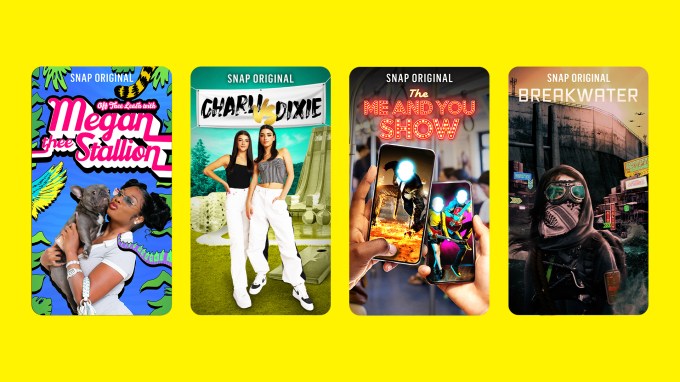
Image Credits: Snapchat
Snap will launch a new Creator Marketplace later this month, which will initially focus on connecting AR Lens Creators with businesses and brands who want to run AR ads. It will then expand to support all Snap Creators by 2022. It also announced a new lineup of Originals, including those with TikTok stars Charli and Dixie D’Amelio, Megan Thee Stallion, and others.
Fintech
Top neobanking app Chime was asked by a California regulator to stop calling itself a “bank” in its website URLs and advertising. The app is not actually a bank — it offers front-end banking services to customers, but the accounts themselves are held with Chime’s banking partners, The Bancorp Bank and Stride Bank, both FDIC members. Chime updated its website to make it clear it’s not a bank. Expect other neobanks to follow suit, soon.
WhatsApp Pay is rolling out to users in Brazil on iOS and Android. The P2P payments feature requires the user has a Mastercard or Visa debit card in one of the following banks: Banco do Brazil, Banco Inter, Bradesco, Itaú, Mercado Pago, Next, Nubank, Sicredi or Woop Sicredi. The feature is also live in India.
Social
Twitter expanded its Clubhouse rival, Twitter Spaces, to all users with 600 followers or more. The company says this number will allow users to have a good experience, but it still plans to expand to all users in the future.
Twitter launched a Tip Jar feature on mobile that lets users tip people directly on their user profile. The feature supports payment platforms PayPal, Venmo, Patreon, Cash App and Bandcamp.
Twitter also rolled out an improved version of its “reply prompts” feature, aimed at cutting down on harmful tweets. The feature, which is now globally available in English on mobile, shows a prompt that asks a user to reconsider their language when they were about to tweet something mean.
And Twitter rolled out the new feature that lets you post bigger images on iOS and Android, without having the images cropped. (Busy week!)
Instagram is rolling out a captions sticker for Stories, and soon Reels. The sticker, which only works in English-language for now, can be customized with your preferred style, color and text.
The majority of WhatsApp users have accepted the controversial privacy update and the company continues to grow its user base, Facebook said this week. Combined, Facebook’s family of apps had 3.45 billion MAUs as of March 31, 2021, up from 3.3 billion on December 31 and 3.21 billion on September 30. The company says it now won’t deactivate accounts for not accepting the new policy, but will keep reminding them.
Facebook opens registration for F8 Refresh, which is free to all developers worldwide. Sessions will include Facebook Business Messaging, Research, Open Source, Login, Business Tools, AR, Stories, Gaming, Startups and more.
Facebook is launching its Nextdoor clone, Neighborhoods, across Canada, and soon, the U.S. Unlike with Facebook Groups, Facebook users on Neighborhoods can create a separate subprofile that includes a custom bio and list of interests, which is included in a Neighborhoods Directory. Neighborhoods will also have moderators who review posts and comments and can hide posts that violate guidelines.
How to watch Global Citizen VAX Live - Stream the concert live from anywhere
08/05/2021 07:30 AM
35 of the best Android games released in the last year
08/05/2021 05:32 PM
Oculus Quest 2 review - The best VR experience
08/05/2021 02:00 PM
The very best Motorola One 5G Ace cases
08/05/2021 01:00 PM
Which AI assistant do you prefer to use
08/05/2021 04:00 PM
Oppo Find X3 will get three years of security updates
08/05/2021 02:00 PM
- Comics
- HEALTH
- Libraries & Demo
- Sports Games
- Racing
- Cards & Casino
- Media & Video
- Photography
- Transportation
- Arcade & Action
- Brain & Puzzle
- Social
- Communication
- Casual
- Personalization
- Tools
- Medical
- Weather
- Shopping
- Health & Fitness
- Productivity
- Books & Reference
- Finance
- Entertainment
- Business
- Sports
- Music & Audio
- News & Magazines
- Education
- Lifestyle
- Travel & Local
2014 © US apps and news







